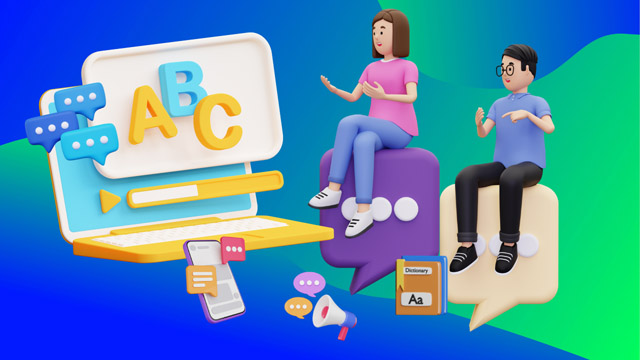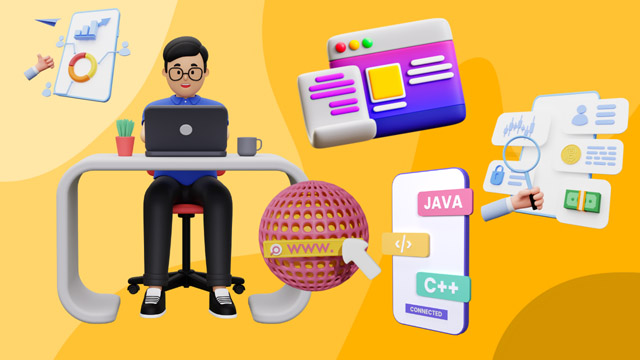- We need special skill set for professional as well as personal life.
- Language Skills are needed to survive in the changing times. Development of Conversational Skills can help the learner in all aspects of life i.e. Professional, Social and Personal.
- The course covers vital skills like Speaking, Listening, Reading, Writing and Understanding in English. Focuses on Vocabulary, Sentence structure, Pronunciation, Intonation (Voice, Pitch), Quality of Communication (Fluency, Emphasis, Pace, Clarity) and Non-verbal communication.

English
This is MKCL’s flagship course with high quality eLearning content which emphasizes on English Communication.
This course offers detailed understanding and hands on experience of English Communication.
Need
Who Should Join
- Students and Graduates: Individuals aiming to improve their English proficiency for academic and career advancement.
- Job Seekers: Those preparing for interviews and seeking to enhance their employability through better communication skills.
- Working Professionals: Employees looking to improve workplace communication, presentations, and interpersonal interactions.
- Entrepreneurs and Business Owners: Individuals aiming to communicate effectively with clients, partners, and stakeholders.
- Individuals Preparing for Competitive Exams: Candidates seeking to strengthen their English language skills for exams and assessments.
- Homemakers and Retirees: Individuals interested in personal development and improving their English communication abilities.
- Non-Native English Speakers: Learners aiming to build confidence in using English in daily life and professional settings.
What you'll learn ?
- This course focuses on the spoken English Skills of the learner
- The emphasis is not only on learning English but on transforming the learner onto the speaker.
- The interactive sessions helps the learner to study real life situations, boosts the confidence to face everyday situations and makes the learner comfortable to speak in English.
Certification
- KLiC English course is recognized by Yashwantrao Chavan Maharashtra Open University (YCMOU).
- MKCL provides certificate to the KLiC learner after his/her successful course completion.
- Yashwantrao Chavan Maharashtra Open University (YCMOU) provides mark sheet to successfully passed KLiC learners from Maharashtra jurisdiction.
Learning Methodology
The academic approach of the courses focuses on the “work-centric” education i.e. begin with work (and not from a book!), derive knowledge from work and apply that knowledge to make the work more wholesome, useful and delightful. The ultimate objective is to empower the Learner to engage in socially useful and productive work. It aims at leading the learner to his/her rewarding career as an employee or entrepreneur as well as development of the community to which s/he belongs. Learning methodology:
- Step -1: Learners are given an overview of the course and its connection to life and work.
- Step -2: Learners are exposed to the specific tool(s) used in the course through the various real-life applications of the tool(s).
- Step -3: Learners are acquainted with the careers and the hierarchy of roles they can perform at workplaces after attaining increasing levels of mastery over the tool(s).
- Step -4: Learners are acquainted with the architecture of the tool or tool map so as to appreciate various parts of the tool, their functions, utility and inter-relations.
- Step -5: Learners are exposed to simple application development methodology by using the tool at the beginner’s level.
- Step -6: Learners perform the differential skills related to the use of the tool to improve the given ready-made industry-standard outputs.
- Step -7: Learners are engaged in appreciation of real-life case studies developed by the experts.
- Step -8: Learners are encouraged to proceed from appreciation to imitation of the experts.
- Step -9: After the imitation experience, they are required to improve the expert’s outputs so that they proceed from mere imitation to emulation.
- Step-10: Emulation is taken a level further from working with differential skills towards the visualization and creation of a complete output according to the requirements provided. (Long Assignments)
- Step-11: Understanding the requirements, communicating one’s own thoughts and presenting are important skills required in facing an interview for securing a work order/job. For instilling these skills, learners are presented with various subject-specific technical as well as HR-oriented questions and encouraged to answer them.
- Step-12: Finally, they develop the integral skills involving optimal methods and best practices to produce useful outputs right from scratch, publish them in their ePortfolio and thereby proceed from emulation to self-expression, from self-expression to self-confidence and from self-confidence to self-reliance and self-esteem!
Syllabus
- Pronouns, Auxiliary and Action verbs
- Punctuation
- Conjugations
- Participles
- Prepositions
- Questions
- Articles
- Verbs and Nouns
- Present, Past and Future Tenses
- Modal Verbs
- Adjectives and Adverbs
- Direct and Indirect Speech
- Interrogative Sentences
- Active and Passive Voice
- Verbs - Auxiliary & Action with Prepositions & Nouns, Demonstrative Determiners like This, That, and Possessive Adjectives
- How much/how many & very Prepositions & Pronouns
- Auxiliary Verbs & Action Verbs, Possessive 's.
- Demonstrative Determiners like Here/There, These/Those, Adverbs of frequency
- Articles – with countable and uncountable nouns & Nouns & Adjectives,
- Articles & Nouns (Countable- Plurals) AND Apostrophe
- There-Their- They're & Conjunctions
- WH-Interrogative with WORDS that are Both Nouns & Verbs + Possessive Pronouns
- Wh-questions in the past & Conjunctions + Object Pronouns
- Articles+ nouns (Uncountable) & Concrete & Abstract Nouns, Collective nouns
- Nouns with Conjunctions & Homophones
- Proper Nouns, Possessive 's & Modal Verbs (Can, could)
- Nouns & Adjectives & Modal Verbs (May, Might)
- Nouns+ Adjectives & Modal Verbs (Should, ought to)
- Verbs & Adverbs & "I'd like" with Comparatives and Superlatives
- Verbs & Adverbs & Modal Verbs (Shall, Used to, and "Going to")
- Intensifiers - Basic , Interjections With Phrasal Verbs
- Infinitive With Verb - Plus-ING – Like
- Sentences - Positive to Negative & Question tags with Types of Sentences - Imperative & Exclamatory
- Gerunds+ Participles with Phrases
- Types of Sentences - Positive to Negative with Types of Sentences - Assertive & Interrogative
- Either-or, Neither-nor , The Infinitive
- Phrasal Verbs & Question tags
- Verbs & Adverbs with Compound Words & Much-Many
- Conditional (Zero & First)
- Adverbial phrases of frequency, time and place with Subjunctive
- Conditional (First & Second)
- Prefix-Suffix with So-such
- Direct - Indirect Speech with Synonyms-Antonyms
- Active-passive voice (Intransitive Verbs) and Want-would like
- Simple Present Tense
- Present Continuous Tense
- Present Perfect Tense
- Present Perfect Continuous Tense
- Simple Past Tense
- Past Continuous Tense
- Past Perfect Tense
- Past Perfect Continuous Tense
- Simple Future Tense
- Future Continuous Tense
- Future Perfect Tense
- Future Perfect Continuous Tense
- Home and surrounding
- Greetings-Routine, seasonal
- Health-Healthy Habits
- Farms-Farmers
- Occupations
- Traveling-transportations
- Family-Relatives
- Neighbours
- Telling time
- Friends
- Describing people-places
- Future plans-Savings
- Accommodation
- Public services: Bank, Post office, etc.
- Education-Schooling
- Competitions
- Hobbies
- Holidays-Picnics
- Social media
- Current Affairs
- Remembering past
- Safety
- Natural disasters
- Nationalities-Countries
- Meetings -Presentations
- Television-Films
- Books-literature
- Food
- Requests
- Dressing-clothing
- Garden
- Animals-Birds
- Directions and addresses
- Personal information
- Games-Sports
- Home town
- Work and jobs
- Look to the future
- Giving gifts
- City-Village life
- Dreams
- Shops- Marketplaces
- Family traditions-Festivals
- Office-Workplace
- Soldiers-Army
- Workplace ethics
- Science-Technology
- Computers & The Internet
- Environment
- Weather-Seasons
- Numbers-Prices
Objectives of the syllabus:
- To make the learner proficient in English Language at a basic level as per the globally accepted standards.
- To help the learner imbibe communication skill necessary for job success with an exposure to verbal and written communication in various contextual situations in day-to-day life with continuous practice and drills through eLearning to ensure accuracy.
- To offer an exposure to communication skill in job / workplace situations involving thought provoking exercises with a continuous practice through eLearning so as to make him/her job ready and attain job success eventually.
The syllabus has been standardized at par with CEFR (The Common European Framework of Reference for Languages) standards.
The course covers the elements given below:
- Context Topics: To ensure that effective communication is attained in relevant domain/subject area.
- Grammar Topics: To make the learner well versed with the language correctly.
The Syllabus ensures that the following skills are achieved:
- Listening
- Speaking
- Conversational Skills
- Reading
- Writing
| Language Skills (L-S-C-R-W) | Sub-Skills |
|---|---|
| Listening (L) | L 1 - Concentration |
| L 2 - Interest in the topic | |
| L 3 - Sense making | |
| L 4 - Understanding | |
| L 5 - Deriving Meaning | |
| L 6 - Memorization and Recall | |
| L 7 - Reflection through Self Expression | |
| Speaking (S) | S 1 - Pronunciation |
| S 2 - Fluency | |
| S 3 - Intonation | |
| S 4 - Clarity | |
| S 5 - Self Expression | |
| Conversation ( C ) | C 1 - Active Listening |
| C 2 - Responding | |
| C 3 - Self Expression | |
| Reading ( R ) | R 1 - Concentration |
| R 2- Deriving Meaning | |
| R 3 - Follow up reading | |
| R 4 - Loud reading | |
| R 5 - Silent reading | |
| Writing (W) | W 1- Understanding and clarity |
| W 2 - Layout | |
| W 3 - Planning the content flow | |
| W 4 - Use of language appropriate to content | |
| W 5- Note making | |
| W 6 - Self Expression |
Evaluation Pattern
Evaluation Pattern of KLiC Courses consists of 4 Sections as per below:
| Section No. | Section Name | Total Marks | Minimum Passing Marks |
|---|---|---|---|
| 1 | Learning Progression | 25 | 10 |
| 2 | Internal Assessment | 25 | 10 |
| 3 | Mini-Projects | - | - |
| 4 | Final Online Examination | 50 | 20 |
| Total | 100 | 40 |
YCMOU Mark Sheet
Printed Mark Sheet will be issued by YCMOU on successful completion of Section 1, Section 2 and Section 4 and will be delivered to the learner by MKCL.
YCMOU Mark Sheet will be available only for Maharashtra jurisdiction learners.
MKCL's KLiC Certificate
The certificate will be provided to the learner who will satisfy the below criteria:
- Learners who have successfully completed above mentioned 3 Sections i.e. Section 1, Section 2 and Section 4
- Learner should have completed Section 3. Section 3 comprises 5 Mini Projects and completion of minimum two mini projects is required to be eligible for Final Examination.
Course Demo
Creating Positive Mindset
Immersive English Language Experience through Story
English Language Learning (Level Wise Skill Attainment)
Contextual Learning through 50 Context Topics
Family - Listen and say sentences
Nationalities – Listening, Understanding & Comprehension
Learning Content, Listening, Speaking, Reading, Writing and conversational activities & Grammar
Listening
Listen Country Name and then Nationality
Speaking
Speech Recognition 1
Speech Recognition 2
Writing
Grammar
KLiC Courses Fee Structure from 01 July, 2025 Onwards
KLiC 120 hour course fee applicable from 01 July, 2025 all over Maharashtra
| KLiC Course Duration | MFO (Inclusive of GST) |
ALC Share (Service Charges to be collected by ALC) |
MKCL Certificate | YCMOU Marksheet |
|---|---|---|---|---|
| 120 hours (Without YCMOU Marksheet) | Rs. 1,000/- | Rs. 5,000/- | Available | Not Available |
| 120 hours (With YCMOU Marksheet) | Rs. 1,118/- | Rs. 5,000/- | Available | Available |
* Above mentioned fee is applicable for all Modes of KLiC Courses offered at Authorised Learning Center (ALC) and at Satellite Center
* Total fee is including of Course fees, Examination fees and Certification fees
* MKCL reserves the right to modify the Fee anytime without any prior notice
KLiC Courses Fee Structure upto 30 June, 2025
From 01 January 2025 onwards, the fees for all KLiC courses in ALCs of Mumbai Metropolitan Regional Development Authority (MMRDA), Pune Metropolitan Regional Development Authority (PMRDA) and Rest of Maharashtra will be applicable as shown in the table below:
KLiC Courses of 120 Hours:
| Mode | Total Fee (Rupees) |
Single Installment (Rupees) |
Two Installments (Rupees) |
| Single Installment | 6000/- | 6000/- | N/A |
| Two Installments | 6200/- | 3100/- | 3100/- |
Total fee is including of Course fees, Examination fees and Certification fees
* Above mentioned fee is applicable for all Modes of KLiC Courses offered at Authorised Learning Center (ALC) and at Satellite Center
* Total fee is including of Course fees, Examination fees and Certification fees
* MKCL reserves the right to modify the Fee anytime without any prior notice



